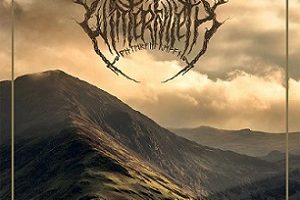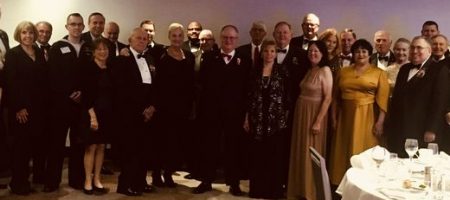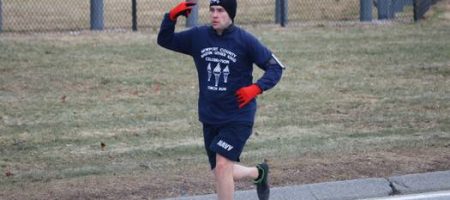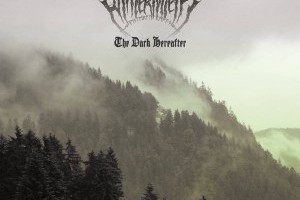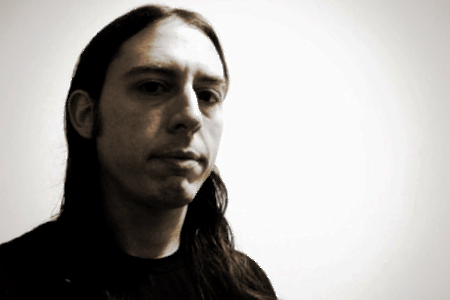Winterfylleth – The Essence of Atmosphere
Wednesday, 27th May 2020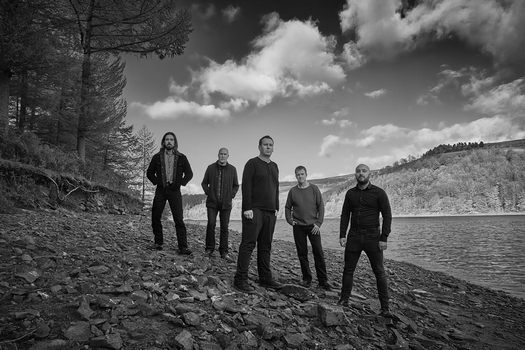
One of the early bands to emerge from the UK with their own take on atmospheric black metal was that of Winterfylleth. An emphasis on nature and national history helped them to make their mark, and it’s been a consistent ride ever since (though with a departure into acoustic material for one album, which we touch upon below). The band’s latest album, The Reckoning Dawn, stands tall like the rest of Winterfylleth’s discography, bringing forth another journey into the mountainside. We chatted with vocalist/guitarist Chris Naughton to get his thoughts on the new material, the importance of history, the growing UK black metal scene, and a taste of his also upcoming release with Atavist.
Dead Rhetoric: The Reckoning Dawn is releasing soon. It’s quite a unique time to be putting out a record.
Chris Naughton: Whenever you do a new record, it’s quite an interesting period of time to find yourself in, I guess. You put yourself out there in a big way. It’s a new set of songs and people are kind of excited about but it’s unknown to them. So the challenge is then to get people to check the songs out and see what they think, and hope that they still like the band and find meaning in those songs. It’s always a challenge, but one that I hope that we are up to.
Now that we are in this lockdown and post-apocalyptic time that we are living in, it feels like quite an insane time to be putting out an album. I don’t think we had visions of it being like this, but we didn’t want to let fans down and delay the album. I think it’s important, as well as having music to give people a bit of insight and hope as well as new content for when they are stuck at home.
Dead Rhetoric: Do you feel that you learned anything new in doing The Harrowing of Heirdom, which was a bit of a departure from the band’s usual sound?
Naughton: Definitely. I think there are lots of things we took away from it really. When we set out to make the last album, it was our sixth album. We always used bits of acoustic material in our albums before, and had toyed with the notion of releasing acoustic music. But when we set out, we wanted to challenge ourselves to do something a bit different. To create an album of songs that still retain the atmosphere of Winterfylleth, but without the electric instruments.
I guess when we came into this new album, we took a lot out of it. When you are writing for instruments that you don’t play, like violin or cello, and some other things that were in the album, it lends a new perspective on how you can create atmosphere and how you put instruments around each other. How you can use instruments to their fullest effect to create the sound that you want in the music.
I think those learnings were applied to these songs on the new album. Now we have the electric guitars back, as well as the screamed vocals and drums and everything else. But when I think about it structurally, we have definitely created more space and room in the songs for atmospherics, lead guitar for the first time in a while, as well as other instrumentation to capture the atmosphere, and in ways that are not just sort of the stock Winterfylleth stuff. I’m hoping that comes across when people hear it, and maybe it challenges what people’s perception of what a Winterfylleth album is a little bit.
Dead Rhetoric: You mentioned atmosphere. How important is atmosphere in the overall role that it plays in the music?
Naughton: I think for me, in this kind of music, atmosphere is everything. I think if you don’t have that, it isn’t very much. To me, this kind of music is very much geared around atmosphere and emotion, and creating another world that you don’t hear so much in other styles. When you hear a death metal album, while it has it’s own charm and power in certain ways, it doesn’t have the same atmosphere and finesse that black metal can have. It’s more technical and like being hit by a hammer, with super chunky instruments and upfront vocals.
As opposed to black metal, where if you get it right, it can sit around you. You can almost sit within it. It has this strange surrounding to it, in the way you play guitar and the sounds that you create. I think that’s why atmosphere is so important. Even though you can play differently or more technically than you do on the songs, I think you have to show a bit of restraint in some areas. The overall effect is that you aren’t trying to show that you can play a superfast kick drum or 17 notes where one might do. Some other genres of music can be guilty of this, or just stylistically that is what they are designed to do. I think that’s almost the enemy of atmosphere at times. Sometimes you need that restraint and space to let some of those things breathe as well. To get back to the original point, atmosphere is everything in black metal, and particularly for us. It’s something I have always been keen on exploring.
Dead Rhetoric: When you are writing and it comes to atmosphere, how do you know, as you are saying with restraint, that something is enough instead of making 20-minute songs?
Naughton: It is a good point. I guess there’s no hard and fast rule to that necessarily. Some of our songs, such as “Green Cathedral” that was on The Dark Hereafter, that are like 13-14 minutes long. You have to go with where you are at, and be critical of yourself. Am I bored of this now? Is this long just for the sake of it? I think some of our songs have started off longer than they ended up because when you go into the studio and putting vocals on them and hearing them in the context of a listener, instead of you just liking the riff you’ve written, you can be more critical.
It think sometimes you have to step back from being a member of the band, and see yourself as a listener and if they will be engaged by it – or is it just needless repetition. For me, I like songs to build and have a purpose the whole time, and reach a climax and conclusion. Most of the time, that seems to fit quite nicely for us in like 7 or 8-minutes. But sometimes it works out to be like 10 or 11-minutes. When you play quite sweeping and flowing music, it needs time to breathe, so naturally we end up with songs that are like 7 to 8-minutes due to the amount of times you have to play something through. I think sometimes, if you listen to a punk rock song or something, where they are playing super-fast riffs and it’s like verse/chorus/verse/chorus/solo/chorus/end, you can fit that into 3 minutes. It’s about immediacy and catchiness.
This stuff is about building atmosphere. You can’t do that in a few moments, you have to let things permeate through the listener a bit more. You need to give them the space to build and grow. You have to be cognizant of it not being super long and boring, but things need time to evolve as well. For me, it’s about self-editing, but letting things be played as long as they need to create the atmosphere you want.
Dead Rhetoric: Could you talk about the connection to nature, particularly in relationship to the artwork that the band has had over the years?
Naughton: I think one of the areas that we have been focused on lyrically and conceptually is a connection to ancient history, and to nature and the old ways. When you look at our album covers, the only one that shows a sense of modernity is the first album, which has a ruined castle on it. Even then, it’s a few thousands of years old. I guess we have always liked the idea, with the covers, is that ongoing connection to nature. A focus on less modernity and the modern world. We try to focus on not having any houses or images of modern life, to kind of remind people about while those things exist and we rely on them to a certain extent, that nature behind it all is the really important thing.
If we lose harmony with that, then we will find ourselves coming into trouble really quickly. If you don’t have that connection with the world, or that sense of respect for it, that’s where we get into trouble. That’s the state where we have come to in society –we exploit nature and we dig all of the minerals out of the world, for pennies. There’s lots of people dying trying to get ore out of the mines or oil out of the ground. There’s only so long that it can go on for. We’ve sort of pushed for people to respect the beauty that surrounds them, despite the fact that we often exist in this harmony with nature – we aren’t harmonious with it.
Dead Rhetoric: Much of the lyrical content over the years goes back to history. What’s important about history?
Naughton: That’s a super broad question, but I guess for me, in terms of Winterfylleth, and I don’t know how it relates to yourself and your own experiences of where you are from – in the British school system, and the broadness of culture as it continues. There’s a desire to hide history or ignore the fact that things have happened. Or that it has no relevance to the modern world. But when you look back on it, it’s funny how the struggles of old mirror the struggles of now. We are much more technologically advanced, but people still go through the same struggles. Wars still happen, disagreements still happen. Equally, we aren’t very well taught, at least in my own personal experience, about the history of ancient Britain and what came before. It’s always been about the bits and pieces of more modern history.
We were also kind of keen to get people to understand that there is really interesting and rich historical and folklore-ish culture in the British Islands. I think a lot of the time, people like to peg Britain as a place with no culture, or a bit combative or something. There’s actually a lot of greatness that comes from here. It’s not just Scandinavia that has this evocative folk history. There’s a lot that is from here too, and we just wanted to touch on that, to bring awareness to it.
Dead Rhetoric: It’s funny how you mentioned things repeating over and over again, with our current situation now. You can go back 100 years and look at Spanish plague and draw those same parallels about what we have or haven’t learned.
Naughton: Nothing, but the sounds of it. I think that’s the problem. Every generation seems to think they know more than the previous one, and in some aspects maybe they do. But I would suggest that there are common themes that exist in the human condition that are universal, and we seem to forget those things.
Dead Rhetoric: How have you grown as a musician in the years with Winterfylleth?
Naughton: I think hugely, really. When we first started, it was like 2006. I was in my early 20s – I had been in previous bands, making records for a few years before that, but I think we have grown by a huge amount. I think you can hear that if you have the opportunity to listen to our back catalog. I don’t think we’ve made a poor record, and I’m still happy with everything we have made. I don’t sit here and wish we had made one differently. They are all reflections of where you are at the time. But I think we have come a long way, and further than I think we thought we could.
It comes from continuing on and challenging ourselves to do better, and listening to music, and being fans of music. You speak to some bands who are so focused on what they are doing that they forget everything else that is going on. There’s so many other great artists out there that you can learn from, or take influence from. It almost saddens me sometimes that people miss out on that, because they are so focused on what they are doing. So I think we try to be aware of that, and learn from ourselves and others, and follow people’s careers and see the mistakes that people make and try to avoid them ourselves. I hope that comes through, and I hope we manage that – but it’s a matter of opinion I guess. But that’s the sort of spirit that we enter these things with.
Dead Rhetoric: There’s been more of a scene for black metal in the UK since the band started. What’s your take on it?
Naughton: It’s grown much more than ever. If I reflect on where we were at the time, there just wasn’t any black metal. We properly started in 2006. If I think about black metal in the UK then, there were obviously bands like Cradle of Filth, who arguably are black metal, but I think lots of fans would also argue that they were more allied to the Norwegian scene than being a British black metal band. There were other bands like Bal Sagoth and Forefather, who were on the fringes of international black metal, but were from the UK.
When we started, there were bands like Wodensthrone, Fen, A Forest of Stars, and a few others but it didn’t really exist. So we ended up playing a lot of shows with each other and tried to build something from nothing. It just so happened that a few of us got good label deals with Candlelight for us, and Prophecy for some of the other guys. We managed to put a few albums out and create something around it. I think now, 13 or 14 years later, there are hundreds of black metal bands from the UK. I think that if it wasn’t for the handful of bands that I mentioned, I wonder where we would be? It took a bit for us to go out there and play some festivals and take some of the flack that we did, for people not taking the British black metal scene seriously, for it to become accepted as something that is not just an oddity now.
There’s now loads of great bands out there now – Necronautical, Wolvencrown, Deadwood Lake, Nine Covens, just loads of them. Anyways, the point being is that it has become greater than the sum of its parts. Now that it has been allowed to be, or accepted, more bands have been able to express themselves that way. I’m really happy about it.
Dead Rhetoric: 2020 is a big year for you with Atavist releasing new material as well. Anything you can say about Absolution?
Naughton: I haven’t imagined putting out 2 albums a few months from each other. But Atavist has been on the boiler for a long time. Myself and Simon [Lucas], the drummer for Winterfylleth, we used to play in Atavist before we started Winterfylleth. I think the last Atavist album came out in 2007. By the time Absolution comes out, it will have been 13 years since we have released anything. We have obviously been super focused on doing Winterfylleth for a long time, as it’s our primary band really. But I’ve always been writing bits and pieces in the background.
I had lots of ideas, and I just contacted the old guys in the band about getting back together and doing something, since I had about an album’s worth of material that I felt was good and worthy enough to be released. So we resurrected the band around 2016 or so and we have been slowly working around other people’s commitments as well as Winterfylleth. We have a full album of broadly death/doom material. I think, again it plays on the atmosphere with that band, but it’s a bit more personal rather than…I don’t think global is the right word, but Winterfylleth is a bit outward-looking. Looking out at topics and down on them and see them for what they are. I think Atavist is very much about the dark night of the soul in a way. That introspection people can feel.
I think, on this album, it’s about a journey of personal discovery in a way, without sounding like a film tagline. It’s about how you experience loss and struggle, and then go through lots of inward emotions and come to a bit of self-realization. The last track is about absolution. It follows a conceptual subject matter of those forced natures that you go through. I don’t know if it’s about finding yourself, but it’s about going through something and finding peace with it, and resolution, and finding a balance when you have been out of balance. It sort of plays around with those ideas, and does that through long, atmospheric songs.
Dead Rhetoric: Does Winterfylleth have any plans in the near future?
Naughton: Hopefully. We have tried to be optimistic rather than pessimistic about all of this. We have provisionally booked some dates with our friends in Panopticon for a small run of shows in October. We had to cancel our shows up to then because of the pandemic, which was going to be starting soon. But we are trying to get some things set up with some other great bands to play some shows in Europe. We are optimistic, but we will see. We have some videos coming out, and the new album. There will be a lot of interesting stuff coming out surrounding that.
We may have to wait up to a year to tour for this album. Hopefully May 2021, the world will have returned to some sense of normality and we can tour around. For now, we are taking it like everybody and taking it for what it is and trying to make the best of it.











